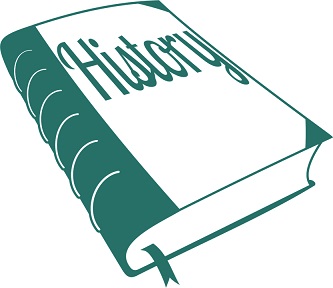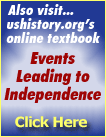
The Declaration of Independence
Lesson Plan
New Ideas in France
- What was the Enlightenment and what were its philosophers trying to achieve?
- What ideas of individual freedom and forms of government emerged from the Enlightenment thinkers Rousseau and Montesquieu?
- How did they differ from the current forms of government at the time and what was the reaction of rulers in Europe to their concepts?
French Influences & The Enlightenment
The Enlightenment, also known as the Age of Reason, occurred across Europe in the late 1600s and into the 18th century. In England, scientists like Isaac Newton and writers like John Locke were challenging old ways of thinking. They were really shaking things up. Newton's laws of gravity and motion described the world in terms of natural laws, not spiritual force. Locke suggested that people should work to change any government that did not protect life, liberty and property.
In Europe, thinkers and writers believed that they were "enlightened" — meaning that they had more reason than the common person. The word reason meant a lot during this time. People believed that reason could be used to build a better world. Leaders of the Enlightenment opposed much of religion because of its demands for political obedience and truth based on religious belief rather than on evidence and proof. They also opposed the idea of inherited monarchy because it had no basis in reason and led to abuse of power. American leaders like Jefferson, Franklin and Adams were greatly influenced by many of these philosophers. These new views helped them to show others that the American Revolution wasn't just a rebellion. It was a new design for how to organize a society that was based upon reason and fairness.
Jean-Jacques Rousseau — The Champion of Democracy

Jean-Jacques Rousseau
Rousseau was born in Switzerland, but he was a resident of France until he died during the American Revolution. He was one of the most popular and respected philosophers of his time. In 1762, fourteen years before the Declaration of Independence, he wrote his most important work, The Social Contract. In it, he writes, "MAN is born free; and everywhere he is in chains. One thinks himself the master of others, and still remains a greater slave than they. How did this change come about? I do not know. What can make it legitimate? That question I think I can answer." He goes on to say that politics and morality should not be separate and that when a government fails to act in a moral way, it has lost its power.
Rousseau was one of the first to stand up for democracy. He believed that individual freedom, equality and justice should always be the focus of a government. Yet he also recognized that in a democracy, individuals would have to give up some of their own wants for the common good. While these ideas may seem abstract, they echo the thoughts first brought up by John Locke. A major theme in the writings of both Locke and Rousseau was that when a government breaks the social contract to protect the common good, the people have a right and obligation to replace it.
Majority rules. The U.S government is built on the idea that we vote and the most votes win. But Rousseau says that there are times when the majority should not rule. Can you create an example of where you think that a single person's wishes should take precedence over the majority?
Voltaire

Voltaire
François-Marie Arouet, best known by his pen name Voltaire, was another famous writer and philosopher whose views shaped the leaders of the American Revolution.
Voltaire was a great admirer of Benjamin Franklin. Near the end of his life, after getting to meet Franklin, he wrote, "When I gave my benediction to the grandson of the sage and illustrious Franklin, the most honorable man of America, I spoke only these words, God and Liberty! All who were present shed tears." The feeling was mutual. Franklin, who lived in France for many years, had brought many Enlightenment ideas to America. In France, Voltaire was the most outspoken crusader for reform. He was very critical of political and social issues such as cruelty and slavery. He was also a critic of the Catholic Church and the French aristocracy. His writing focused on corruption and religious intolerance — two things that many colonists experienced under British rule. Because of his criticism, he lived most of his life in fear of being jailed. After being imprisoned twice, he moved to England for more than two years to escape. While living there, Voltaire met important thinkers such as Isaac Newton and John Locke. Most of his writing was banned in France. Voltaire is famous for his strong belief in freedom of speech and once said, "I do not agree with a word that you say, but I will defend to the death your right to say it."
Are there any circumstances where it should be illegal for you to say what you think? Can you come up with a situation or can you always say whatever you want?
Montesquieu

Baron de Montesquieu
Charles-Louis de Secondat, baron de Montesquieu, was another Frenchman who had a major impact on the Founding Fathers. James Madison, the Father of the Constitution, was a big follower of Montesquieu's ideas. Eight years before the Declaration of Independence, Montesquieu wrote The Spirit of the Laws. In it, he described three main forms of government:
- monarchies, which were based on honor and headed by a king or queen;
- republics, which were based on virtue and headed by a popularly elected official; and
- despotisms, which were based on fear and headed by dictators.
In a republic, he said, there should be checks and balances on government to ensure that liberty is maintained. To do this, he said, governments should divide power between three separate branches of government: the legislative, the judiciary, and the executive. Montesquieu's work was well received in Britain and widely read in the colonies, but it created uproar in France because his concept of government was offensive to the French monarchy.
What two questions would you ask of Montesquieu about "the balance of Power" concept?
The Heritage of the Enlightenment
Today, the Enlightenment is often viewed as a rare, brief moment when a number of scholars all published their ideas about the perfect society. They believed a perfect society could be built on common sense and tolerance. Unfortunately, this period did not last long. The French Revolution and a period of Romanticism came shortly after and since then, many groups, from religious thinkers to historians, have viewed the Enlightenment negatively.
Yet in many ways, the principles of the Enlightenment are still alive. The concept of basic human rights still inspires oppressed people throughout the world. Wherever religious conflicts erupt, mutual religious tolerance is brought up as a solution. Rousseau's idea of self-rule has influenced many models of government. Even though these concepts started out as European, they have also become global. They have also formed the standards used in international law and governance today.
Still, the Enlightenment was never as simple as it has often been portrayed. Voltaire was not a simplistic optimist and he did not believe that it was possible to create an ideal society. Rather he tried to persuade Europeans from using stupidity and ignorance when dealing with governmental matters. All in all, whether we acknowledge it or not, we still think today more like him than like his enemies.
Of the views expressed by Rousseau, Voltaire, and Montesquieu, whose views of government do you find most appealing? Explain why in two sentences.
Finish the following silly poem helping Rousseau, Voltaire, or Montesquieu to get his point across:
Roses are Red
Violets are blue
...
- What was the Enlightenment and what were its philosophers trying to achieve?
- What ideas of individual freedom and forms of government emerged from the Enlightenment thinkers Rousseau and Montesquieu?
- How did they differ from the current forms of government at the time and what was the reaction of rulers in Europe to their concepts?
Start page | The Document | A Reading | Signers | Related Information | Jefferson's Account | Declaration House | Declaration Timeline | Rev. War Timeline | More Resources | Lesson Plan |






